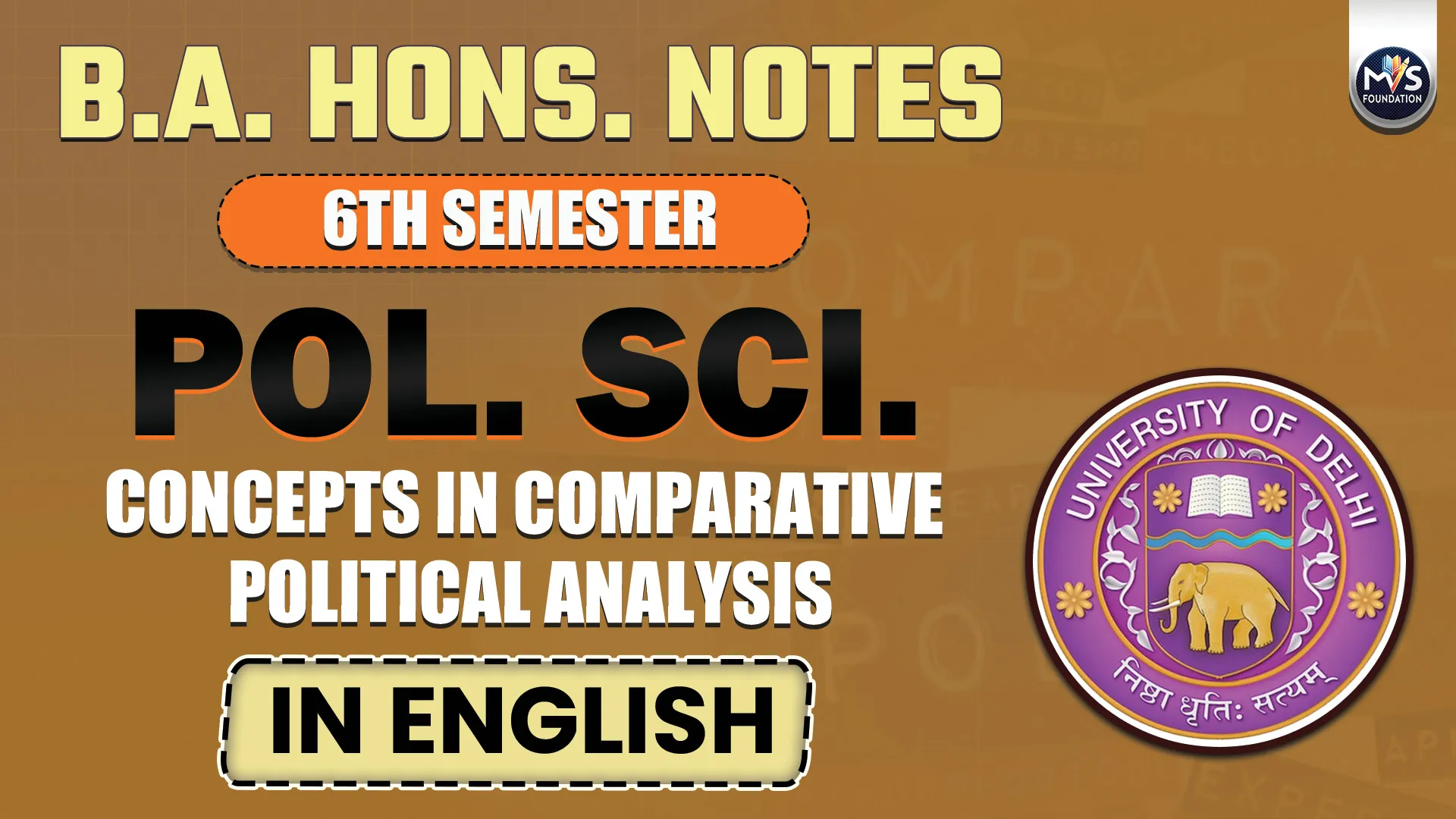
Get in Touch
We will get back to you within 24 hours.
Welcome to MVS Blog

Q-1 Define Capitalism. Do you agree that globalization is the face of modern capitalism ? Elucidate.
OR
Globalization has affected the political processes of the nation-state. Discuss.
Answer -
Introduction
During the early Renaissance, capitalism originated in the 15th and 16th centuries However, evidence of the capitalist system is also found in ancient civilizations. The Industrial Revolution of the 18th century established capitalism as a dominant mode of production, characterized by the division of 'work' and 'labour' in the factory. Through the process of globalization, capitalism spread across the world in the 19th and 20th centuries.
Simple meaning of Capitalism:
Capitalism: It is called that system or economic system in which the means of production are owned by some special people (capitalists), in which the main objective of production is to obtain maximum profit.
Definition of capitalism according to different thinkers
Modern Capitalism:
Modern capitalism, where private companies are free to make profits, can make more profit through trading and investing in global markets. As a result, globalization gets a boost. In modern capitalist economies, companies try to sell their products and services not only in their own country, but all over the world.
1. For example, Apple: This is an American company that designs its products in the US, manufactures their components in China and other countries, and sells them all over the world. This reduces the company's cost of production and helps them strengthen their presence in the global market.
2. For example, a car company Toyota: Its parts are made in various countries engines in Japan, seats in Thailand, and electronics in Germany. Then all these parts are combined to form the final product. This allows companies to produce at different locations for the best quality and cost.
Globalization is a process through which the people of the world connect with each other. This includes world politics, economics, and culture. Through globalization, there is an exchange of goods, services, investment, and technology between different countries. Due to globalization, the standard of living of people around the world has improved significantly.
Globalization is the Pattern of Modern Capitalism:
1. Globalization as Modern Capitalism:
Globalization is a complex and widespread process that has affected various aspects of the global society and economy. Modern capitalism has expanded international trade. This has led to an increase in global trade and strengthened economic ties between different countries. Such neo-liberal policies were adopted by most countries around the world in the 1990s and became the dominant ideology of the new world economy.
2. Market Expansion
Globalization has given an unprecedented boost to international markets, giving companies the unique opportunity to sell their products and provide services globally. As a result of this, companies have succeeded in spreading their business activities beyond borders. Now companies are no longer dependent on local markets, but they are providing their products and services in markets across the world
3. Technological Development and Globalization:
Technological development has played a very important role in modern capitalism. Globalization has accelerated the spread of technology, making production processes more efficient and profitable. For example, the Internet and communication technologies have made business transactions simpler and faster.
4. Global expansion of global economic institutions:
In the 1990s, global financial institutions such as the World Bank and IMF (International Monetary Fund) promoted certain principles. These principles were called the "Washington Conventions", and included permanence, privatization, liberalism. Due to these policies, neo-liberal capitalism spread to those countries of the world which were earlier far from them.
Impact of Globalisation on Political Responses of the Nation-State:
1 loss of state sovereignty:
In the era of globalization, the rise of international institutions, para-national organizations and global pressure groups has weakened the policy-making capacities of states. U.N.Institutions like WTO, IMF have exercised significant influence on the economic and social policies of states. In addition, international social movements and NGOs have also begun to press national policies, forcing states to strike a balance between their civil society and global demands.
2 Economic autonomy and globalization:
According to Kin'ichi Ohme, the nation-state has become an unnatural and dysfunctional entity in controlling economic activity. The proliferation of global supply chains, multinationals, and financial markets has weakened control over states' economic policies.
3 Changes in political and social structures:
Suzanne Strange has pointed out that the declining authority of the state has led to changes in political and social structures. The state has now become part of various international and regional networks and cooperatives, reducing their traditional role and jurisdiction.
4 Technological development and the role of the state:
According to Robert Gilpin, the impact of globalization is the result of technological development. Technological development has changed international relations and trade, which has also changed the role of the state. States have adapted their policies according to these technological changes.
5 Transformational view of globalization:
According to David Held and Anthony Emsigrieve, globalization has transformed institutions, the use and distribution of power. They believe that under globalisation, the state is likely to become powerful in some areas and lose authority in some areas.
Evalutaion
Starting with the early Renaissance, the Industrial Revolution of the 18th century established capitalism as a dominant economic system. Globalization in the 19th and 20th centuries spread it around the world, leading to an unprecedented expansion of international trade and investment. Globalization and capitalism are deeply intertwined and reinforce each other. Globalization has expanded markets, fueled technological development, and increased the influence of global economic institutions. It has challenged the sovereignty of states and brought about changes in their economic and political structures. Modern capitalism has strengthened global economic relationships through technological advances and international trade, making global markets and companies more deeply interconnected.
Conclusion
Finally, we can say that globalization is a replica of modern capitalism because it promotes the free flow of capital, goods, services, and labor on a global scale. These lead to the global spread of capitalist principles, which intertwines globalization and capitalism.
0 Response